WORLD ENVIRONMENT DAY 2025, City Council of Port-Louis, 5th June 2025
World Environment Day 2025 was organized by MACOSS. A Colloquium was convinced at the Municipal Council of Port-Louis on 5th June 2025.
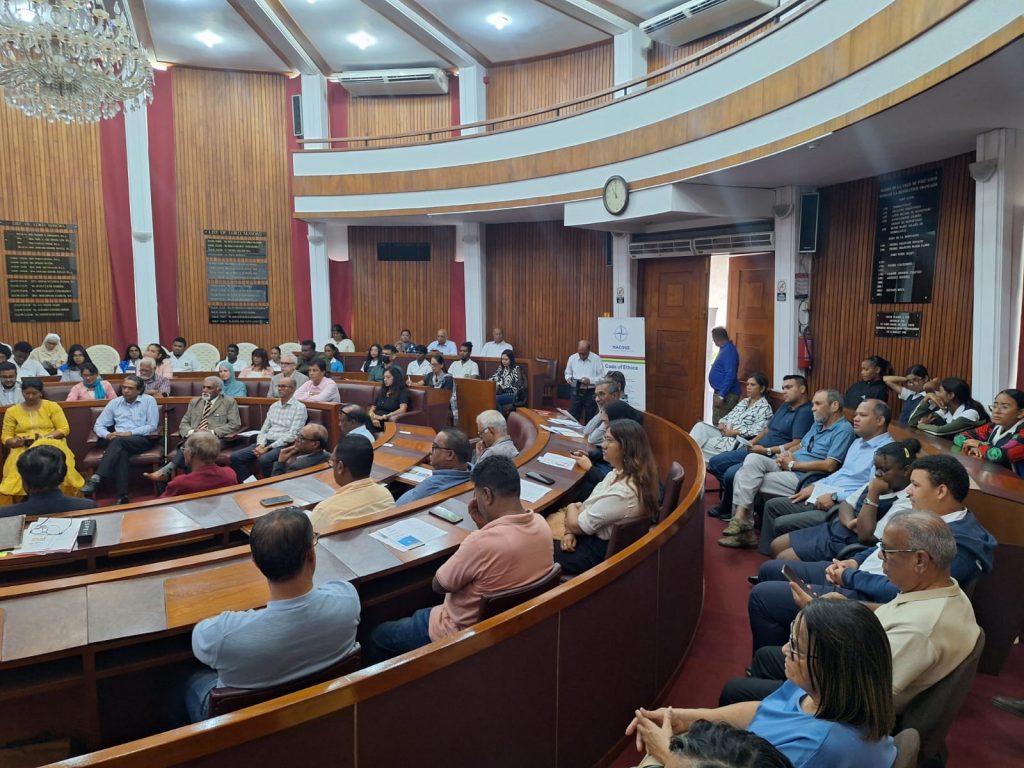
The Chief Guest was His Lordship, the Lord Mayor of the City of Port-Louis, Mr. Aslam Adam Hossenally. The welcoming address was done by Mr. Suraj Ray, Chairperson of MACOSS. Mr. Ashok Beehary was the master of ceremony. Resource persons who delivered their expose were: (1) Mr. Nundkeswarsing Bossoondyal, CEO of the United Nations Association of Mauritius, (2) Mr. Sattyhudeo Tengur, CSK, President of the Association for the Protection of Environment and Consumers, and (3) Miss Bibi Adilah Aungraheeta, Research Project Manager at Reef Conservation. Participants were affiliates of MACOSS, NGOs representatives, Secondary schools, and university students. After the expose of the above three resources persons, it was followed with an interactive session – Questions and Answers.
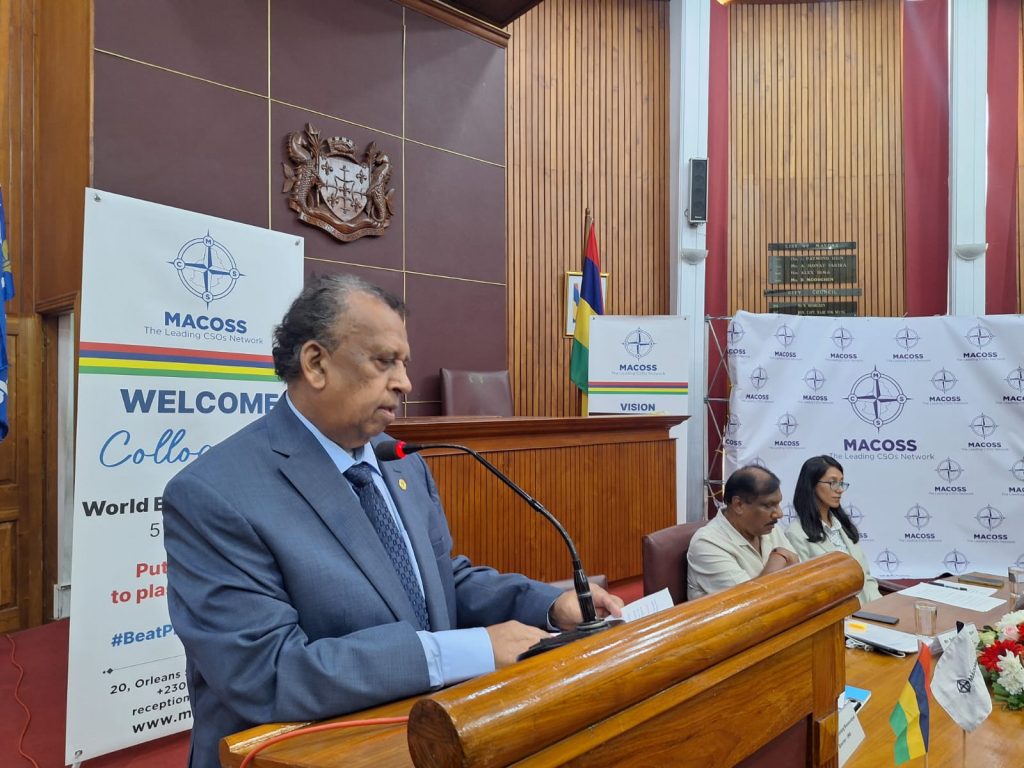
Expose by: “Nundkeswarsing Bossoondyal, Chief Executive Officer of the United Nations Association of Mauritius.
His Lordship, Honorable Mr. Aslam Adam Hossenally, the Lord Mayor of the City of Port Louis, and Chief Guest of the Colloquium on World Environment Day.
Mr. Suraj Ray, Chairperson of the Mauritius Council of Social Services.
Mr. Sattyhudeo Tengur, CSK, President of the Association for the Protection of the Environment and Consumers.
Miss Bibi Adiilah Aungraheeta, Research Project Manager at Reel Conservation
Distinguished guests and participants and
All Protocol Respected.
Allow me to congratulate the President, Secretary, and the Executive Committee Members of MACOSS for organizing today’s event marking World Environment Day 2025.
The theme this year is Putting an End to Plastic Pollution. It is an ongoing priority to reduce the use of plastic, as it poses a major threat to a safe and healthy life.
Your forum is indeed an opportunity to raise awareness on environmental issues like climate change, pollution, deforestation, and biodiversity loss, and to encourage individuals to take concrete steps to protect the planet and promote sustainability.
As you may be aware, World Environment Day was designated and established by the United Nations General Assembly in 1972. The first World Environment Day was observed in 1973 under the theme Only One Earth. The theme for 2025 is Putting an End to Plastic Pollution.
The Significance of World Environment Day:
The triple threat of pollution, biodiversity loss, and climate change is worsened by plastic pollution. Eleven million tons of plastic waste are dumped into water ecosystems every year. Microplastics from landfills and sewage accumulate in soil and cause serious environmental damage. The estimated yearly cost of plastic pollution is between 300 and 600 billion United States dollars.
Environment Day encourages governments to implement substantive policy reforms while educating the public. Today, more than 150 countries observe the day through clean-up programs, tree planting, awareness campaigns, school events, and commitments to environmental improvement.
This year, the official host of World Environment Day is South Korea.
My organization, the Socialist Working Youth League of Mauritius, founded in 1971, launched the United Nations Association of Mauritius in 1975. We started our environmental campaigns in 1972, the same year the United Nations General Assembly declared the launching of World Environment Day.
Since 1973, our Youth League and then the United Nations Association of Mauritius have been active in creating awareness about safe living conditions and environmental practices. At that time, the Ministry of Social Security, led by the late Minister Badry, was extremely helpful in providing us with Social Welfare Centers to organize forums, debates, exhibitions, and talks.
In the early 1970s, Mauritius launched public health campaigns to eliminate malaria by removing stagnant water and household waste, which served as mosquito breeding grounds. Despite achieving malaria-free status in 1973, a resurgence in 1975 highlighted the need for ongoing vigilance. The proliferation of plastic waste has presented new challenges, as discarded containers like bottles and bags collect rainwater, creating ideal mosquito habitats. Studies in regions such as the Lakshadweep islands have shown that these plastic accumulations lead to increased populations of Aedes mosquitoes, vectors for diseases like dengue and chikungunya. Additionally, chemicals like Bisphenol A (BPA), leaching from plastics, have been found to accelerate mosquito development, shortening their lifecycle and potentially increasing disease transmission. These findings underscore the importance of proper plastic waste management in controlling mosquito populations and mitigating vector-borne diseases.
Thanks to the United Nations for its active role in setting global standards and creating awareness, especially in developing countries. With the establishment of the United Nations Environment Programme on 5 June 1972 in Nairobi, and the Environment Liaison Centre International launched during the Stockholm Earth Summit, innovative approaches to environmental problems were developed globally. The United Nations Framework Convention on Climate Change (UNFCCC), established in 1992, has also been pivotal in guiding global efforts to combat climate change, including addressing the environmental impact of plastics. The UNFCCC guides countries in reducing greenhouse gas emissions from all sources, including plastics. Mauritius has ratified the UNFCCC, reinforcing its commitment to tackling plastic pollution and climate change together.
We should be deeply grateful to the United Nations for introducing the Millennium Development Goals from 2000 to 2015, which emphasized poverty reduction and environmental concerns. We are also grateful for the adoption of the United Nations Sustainable Development Goals 2015 to 2030, focusing on five key areas: people, planet, prosperity, peace, and partnership.
The UN Sustainable Development Goals include 17 objectives covering all aspects of human and planetary well-being.
Among these, Goal 13 is especially relevant today. It concerns climate action. Plastic pollution is deeply linked to climate change. Climate change, in turn, causes poverty and affects the environment in many ways, rising temperatures, sea level rise, drought, floods, and more. These changes directly affect our water, energy, transportation, agriculture, ecosystems, and public health.
We often consider climate change a problem of the future, but it is already happening. People and ecosystems across the globe are being impacted today.
Ending plastic pollution requires a multi-faceted approach. This includes individual effort, policy reform, and technological innovation. By reducing consumption, promoting reuse, and recycling, and developing sustainable alternatives, we can drastically reduce the negative impact of plastic waste on the environment.
Like the saying goes, charity begins at home. Let us start by:
Reducing our use of single-use plastics,
Recycling correctly,
Participating in or organizing clean-up activities at beaches, rivers, and public areas,
Avoiding products that contain microbeads,
Spreading the message of sustainability,
Replacing plastic with cloth bags and raffia bags…
Supporting legislation to reduce plastic production and waste… and for this, I would like to commend the pioneering efforts of Rodrigues by the first in the Republic to lead the way in 2014 to ban the use, sale and distribution of plastic bags through the Rodrigues Regional Assembly (Prohibition of Use of Plastic Bags) Regulations 2014, setting a strong example. Mauritius followed with the Environment Protection (Banning of Plastic Bags) Regulations 2015, effective from 1 January 2016, and reinforced the effort with the Environment Protection (Banning of Plastic Bags) Regulations 2020, in force since 1 March 2021. These measures reflect the shared commitment of the island to reduce plastic pollution and safeguarding the environment.
There are many more examples, and I will leave it to the other speakers to expand on the theme of ending plastic pollution.
World Environment Day 2025 is being observed at a time of increasing environmental challenges. The world environment is being degraded, and we need significant financial and human resources to tackle ongoing issues like climate change, food insecurity, air pollution, plastic pollution, illegal wildlife trade, unsustainable consumption, and sea level rise. These efforts must drive both behavioral change and policy transformation at local, national, and international levels.
To conclude, I wish to briefly raise two pressing issues:
Food Security:
What are we doing in Mauritius to ensure food security? Can we look into importing high-quality seedlings, such as those from Holland? For example, cauliflowers weighing 5 to 10 kilograms or tomatoes approaching one pound.
Flooding and Water Shortages:
What concrete steps are we taking, to manage floods and address water shortages? We should consider building barrages at large rivers, deepening our reservoirs, and encouraging each municipal and district council to create their own water collection infrastructure to redirect excess and floodwaters.
Thank you.
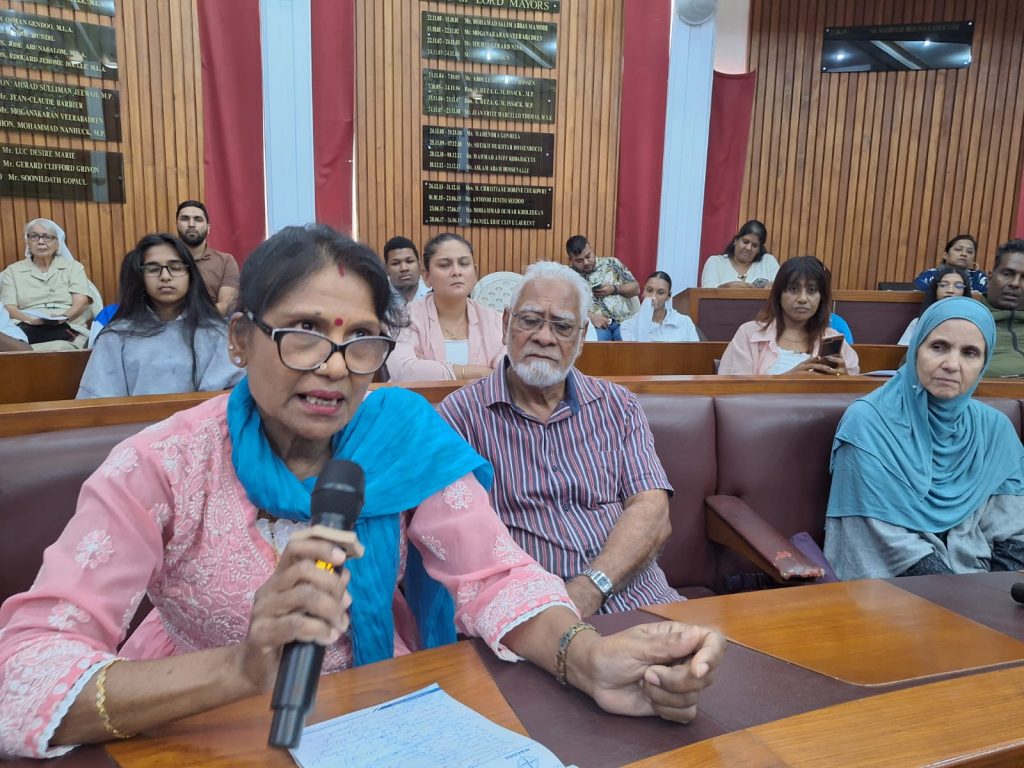
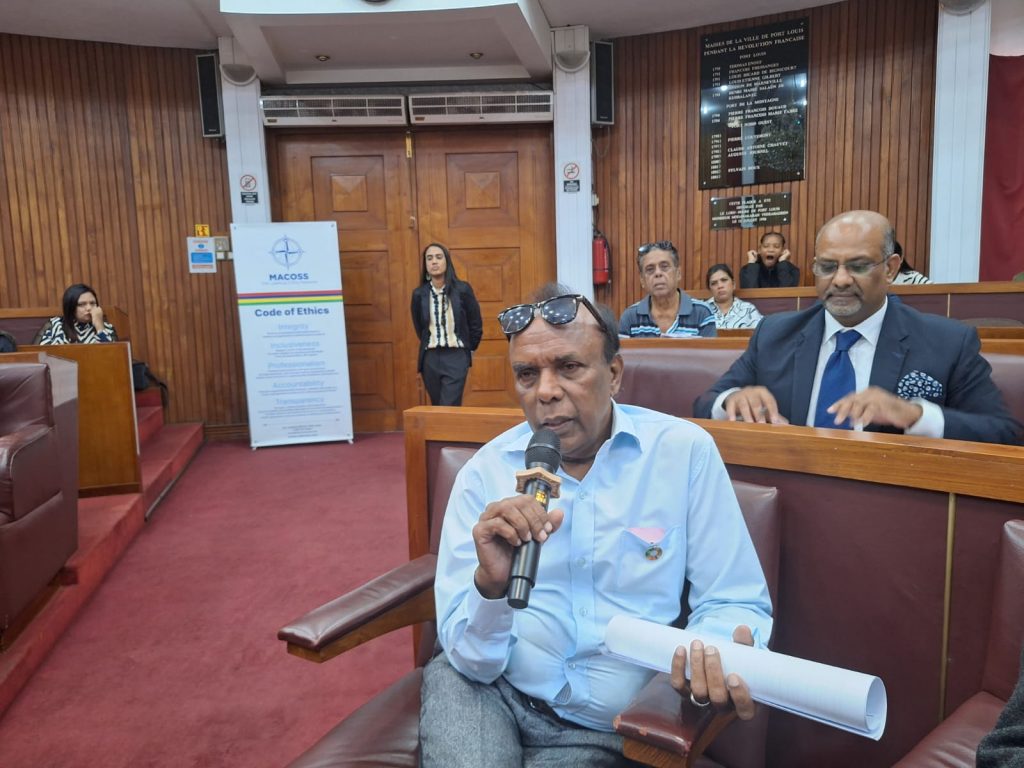
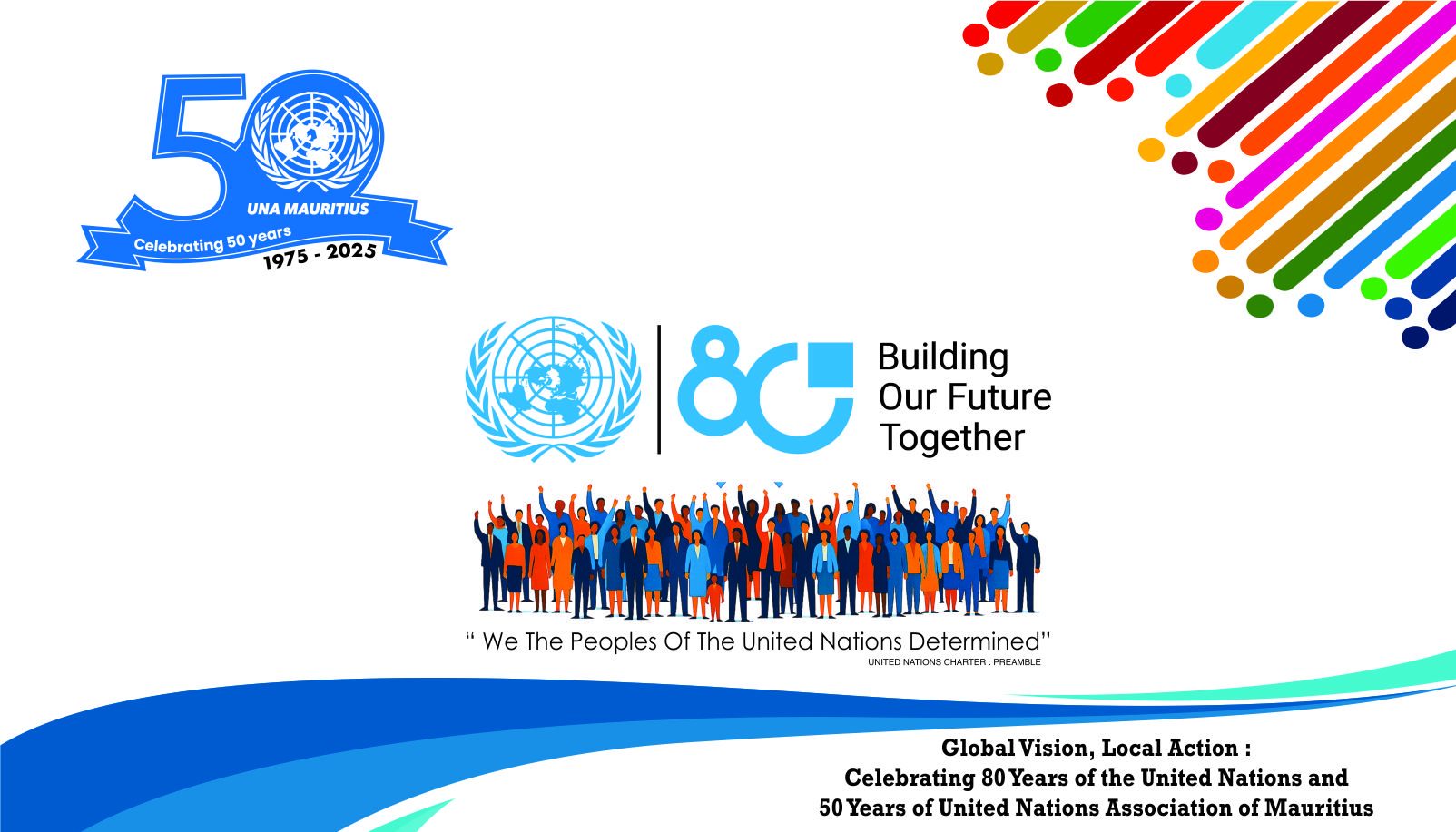




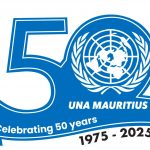

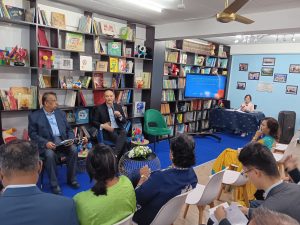
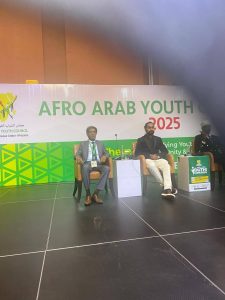

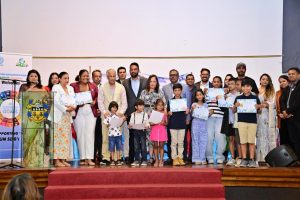
More Stories
SYMPOSIUM AND PHOTO EXHIBITION – PEACE BEYOND BORDERS • • BUILDING A UNITED FUTURE
AFRO-ARAB YOUTH COUNCIL CONGRESS
World Youth Festival Assembly 2025